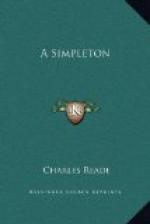“Twenty-two,” cried the dealer.
“Too late,” said the auctioneer.
“I spoke with the hammer, sir.”
“After the hammer, Isaacs.”
“Shelp me God, we was together.”
One or two more of his tribe confirmed this pious falsehood, and clamored to have them put up again.
“Call the next lot,” said the auctioneer, peremptorily. “Make up your mind a little quicker next time, Mr. Isaacs; you have been long enough at it to know the value of oak and moroccar.”
Mrs. Staines and her friend now started for Morley’s Hotel, but went round by Regent Street, whereby they got glued at Peter Robinson’s window, and nine other windows; and it was nearly five o’clock when they reached Morley’s. As they came near the door of their sitting-room, Mrs. Staines heard somebody laughing and talking to her husband. The laugh, to her subtle ears, did not sound musical and genial, but keen, satirical, unpleasant; so it was with some timidity she opened the door, and there sat the old chap with the twinkling eyes. Both parties stared at each other a moment.
“Why, it is them,” cried the old gentleman. “Ha! ha! ha! ha! ha!”
Rosa colored all over, and felt guilty somehow, and looked miserable.
“Rosa dear,” said Dr. Staines, “this is our Uncle Philip.”
“Oh!” said Rosa, and turned red and pale by turns; for she had a great desire to propitiate Uncle Philip.
“You were in the auction-room, sir?” said Mrs. Cole, severely.
“I was, madam. He! he!”
“Furnishing a house?”
“No, ma’am. I go to a dozen sales a week; but it is not to buy—I enjoy the humors. Did you ever hear of Robert Burton, ma’am?”
“No. Yes; a great traveller, isn’t he? Discovered the Nile—or the Niger—or something?”
This majestic vagueness staggered old Crusty at first, but he recovered his equilibrium, and said, “Why, yes, now I think of it, you are right; he has travelled farther than most of us, for about two centuries ago he visited that bourn whence no traveller returns. Well, when he was alive—he was a student of Christchurch—he used to go down to a certain bridge over the Isis and enjoy the chaff of the bargemen. Now there are no bargemen left to speak of; the mantle of Bobby Burton’s bargees has fallen on the Jews and demi-semi-Christians that buy and sell furniture at the weekly auctions; thither I repair to hear what little coarse wit is left us. Used to go to the House of Commons; but they are getting too civil by half for my money. Besides, characters come out in an auction. For instance, only this very day I saw two ladies enter, in gorgeous attire, like heifers decked for sacrifice, and reduce their spoliation to a certainty by employing a broker to bid. Now, what is a broker? A fellow who is to be paid a shilling in the pound for all articles purchased. What is his interest, then? To buy cheap? Clearly not. He is paid in proportion to the dearness of the article.”




